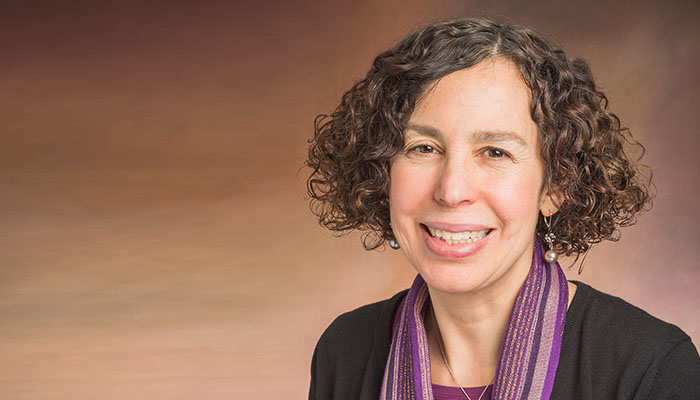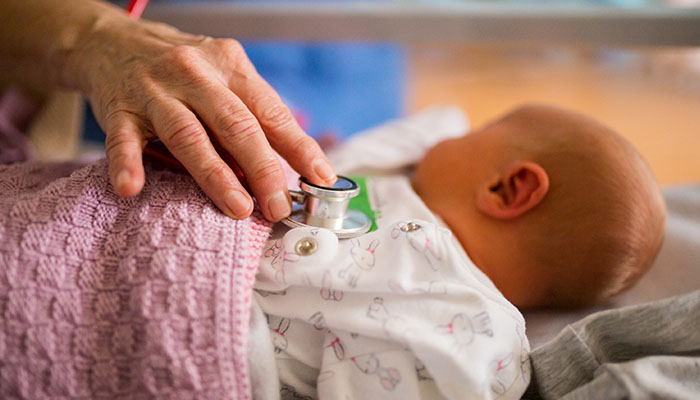HOW CAN WE HELP YOU? Call 1-800-TRY-CHOP
In This Section
PA Pediatrician of the Year: Q&A With Karen Puopolo, MD, PhD

Karen Puopolo, MD, PhD
Editor's Note: Karen Puopolo, MD, PhD, a neonatologist at Children's Hospital of Philadelphia, professor of Pediatrics at the University of Pennsylvania Perelman School of Medicine, and chief of the Section on Newborn Medicine at CHOP Newborn Care at Pennsylvania Hospital, received the 2022 Pennsylvania Pediatrician of the Year Award from the American Academy of Pediatrics. Each year, this prestigious award is granted to a Keystone State pediatrician who exemplifies the ideals of the pediatric profession and participates in activities that reflect the foundation of the chapter. Read on to learn about Dr. Puopolo's notable career as a national leader and researcher in the field of neonatology and what this honor means to her.
You recently received the prestigious Pennsylvania Pediatrician of the Year Award from the American Academy of Pediatrics. Congratulations! What does this award represent to you?
I am so honored to have received this recognition. I am humbled to know that our work addressing neonatal early-onset sepsis and perinatal COVID-19 was meaningful to clinicians and useful to the care of newborns and their families.
What led you to choose a focus in pediatric neonatology?
From the moment I was accepted to medical school, I knew that I would specialize in Pediatrics. The decision to specialize in neonatology came more slowly. At different points, I thought I would specialize in pediatric intensive care, and later in pediatric infectious diseases. In the end, neonatology offered me the opportunity to practice in an area that required technical intensive care skills, as well as to focus on a subspecialty of pediatrics where infectious disease was a key aspect of management.
What research projects are you most proud of?
I began my medical research career as a laboratory-based scientist focused on Group B Streptococcus and feel fortunate to have trained with some impactful scientists: my PhD thesis advisor Michael Forgac, PhD, at Tufts and my postdoctoral advisors Lawrence Madoff, MD, and Dennis Kasper, MD, at Harvard.
Over the past decade or so, however, I have focused my research efforts on risk assessment in neonatal sepsis. No matter the gestational age at which an infant is born, pediatricians need to evaluate their risk for infection at birth. So this is done around 4 million times a year in the United States. In collaboration with Gabriel Escobar MD, at Kaiser-Permanente, I developed and validated models to quantify the risk of neonatal early-onset sepsis that became the widely disseminated Neonatal Early-Onset Sepsis Calculator. This has fundamentally changed the way pediatricians care for newborns — safely reducing overall antibiotic use at birth and decreasing the rate at which newborns are separated from their mothers at birth and subjected to medical interventions.
Similarly, my research group, including my mentees Sagori Mukhopadhyay, MD, MMSc, and Dustin Flannery, DO, MSCE, has developed new ways of looking at infection risk among very preterm newborns, defining the concept of a 'low-infection risk' preterm infant who can be spared empiric antibiotics at birth, and moving neonatologists away from the idea that all very preterm infants must be given antibiotics on admission to the NICU. I've been fortunate to work with colleagues at the American Academy of Pediatrics to revise national guidance on these topics and ensure that our research findings are translated into everyday care of newborns at all gestational ages.

Neonatology is the best job in Pediatrics, according to Dr. Puopolo, recipient of the Pennsylvania Pediatrician of the Year Award.
How has the field of neonatology evolved since your career began, and how do you stay on the cutting edge of your field?
The remarkable change in neonatology over my lifetime has been the profound changes in survival. My mother gave birth to an infant at 28 weeks in the mid-1960s, and the baby was provided comfort-oriented care, living only a brief time. In 2021, more than 90% of infants born at 28 weeks in this country survived, and we provide intensive care to infants born as early as 22 weeks' gestation.
But perhaps the biggest change I have seen in the span of my career is a shift from a focus on survival to a focus on the longer-term impacts of our care. When I was still in fellowship training, our field had to grapple with the first evidence that a common steroid therapy we gave chronically ventilated babies was associated with a greater risk of long-term brain damage. That was a real wake-up call to our field.
Now, whether we are evaluating optimal use of old therapies, like antibiotics, or conducting trials of new therapies or practices, the outcomes of interest are not simply survival or resolution of single morbidity, but a focus on how therapies impact long-term childhood health, particularly neurodevelopment. We want to give our children not just life, but the healthiest life that we can give them.
What advice do you have for young pediatricians and researchers who are beginning their careers?
Medicine is hard. It takes tons of hard work to get a chance to train; the training is hard, and when training is over, the everyday experience as a physician is not much easier. So make sure you love it! There is a lot to love about it. I would never make a different choice. But choose your specialty wisely and your colleagues wisely. If you are doing what you love, the time flies by.
Any additional thoughts to share?
Neonatologists have the best job in pediatrics! We have the privilege of caring for another parent's child at their most vulnerable moments after birth and can help them on their way to decades of life. And in neonatology, I have the best job — studying what we do and devising ways to do it better. I've been additionally blessed to work with wonderful, smart, and dedicated colleagues and mentees.


